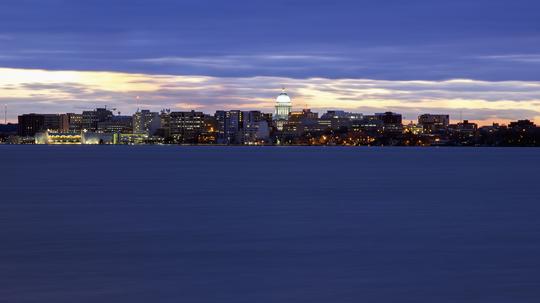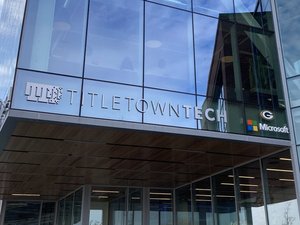
In 2019, Wisconsin made strides to position itself as a place for tech and startup growth. Northwestern Mutual in Milwaukee launched a $150 million fund to invest into startups. Madison was named No. 7 on a list of the best startup cities in the Midwest. And Titletown Tech, the venture hub and fund operated by the Green Bay Packers and Microsoft, officially opened.
Each milestone was evidence of Wisconsin’s growing tech ecosystem. To get a sense of what Wisconsin’s tech future looks like, Wisconsin Inno asked several venture capitalists and startup experts about what they see coming down the pipeline in 2020.
When it came to forecasting 2020, experts' predictions varied, but they mostly agreed that Wisconsin’s tech and startup ecosystem will continue to build on what it accomplished in 2019. They emphasized that Wisconsin’s tech economy will diversify and that more startups will exit.
Through numerous interviews, Inno narrowed down the top five predictions for the state’s tech and startup ecosystem. Dive into each below.
Wisconsin Will Continue See Growth in the Medtech, Biotech Space
Some of the most well-known and largest tech successes in the state have come from biotech and medtech startups. Of course, there’s Exact Sciences, the Madison-based maker of the take-home colon cancer test, which went public in 2001, and Epic, which has grown into a massive electronic health record provider.
But on the startup side, Wisconsin has seen successes like Madison’s Propeller Health, which was acquired by ResMed for $225 million in 2018. Additionally, Shine Medical Technologies in Janesville received 2018’s largest financing deal when they announced a $150 million commitment from Deerfield Capital.
The three largest funding rounds of 2019 were all raised by medtech or biotech companies, according to data compiled by Wisconsin Inno, and this is a trend that will continue into 2020, said Abby Taubner, a partner at Wisconsin startup accelerator gener8tor.
“Madison has always had a leg up on Milwaukee in terms of life sciences companies and maybe even companies in the healthcare realm,” Taubner said. “But we’re about to see the playing fields evening out a little bit more.”
Craig Dickman, the managing director of TitletownTech, said that in just the last six months that his program has been officially operating, several practicing physicians in Wisconsin have pitched their startup ideas to the firm.
And not only will biotech and medtech startups gain new traction, but established healthcare organizations will also be dipping their toes into the local innovation industry.
Last year, Advocate Aurora began hosting a reverse startup pitch competition and UnityPoint Health, one of the Midwest’s and Wisconsin’s largest healthcare systems, launched a $100 million venture fund to invest in healthcare and biotech startup companies.
“We’ve seen a lot of healthcare organizations get more involved in the venture scene,” Taubner said. “We’re seeing people really step up to the plate and get involved with the community more.”
Wisconsin’s Tech Industry Will Diversify
Though the state’s tech economy has long been dominated by medtech and software companies, Aaron Hagar, the vice president of entrepreneurship and innovation and sector strategy development of the Wisconsin Economic Development Corp., said more companies in other industries will begin to flourish.
“When we look at some of the companies that are in the various pitch contests, we’re not pigeon-holed into one area or another,” Hagar said.
Because of the Midwest’s history with manufacturing, Wisconsin could see more logistics-tech companies popping up, as well as cybersecurity and cloud infrastructure startups.
J. Dietenberger, a Milwaukee college professor, innovation leader and 2019 50 on Fire winner, also said he expects to see artificial intelligence and machine learning startups gain more momentum in 2020.
“Data is going to continue to be gold,” he said. “It is the new oil.”
More Wisconsin Startups Will Exit
The life cycle of a startup often entails growing toward an exit of some kind, whether it be an acquisition or going public. In recent years, Wisconsin has seen a steady flow of startup acquisitions (IPOs are much rarer in the state), and experts think Wisconsin could see an uptick in the number of startup exits in 2020.
“Over 2018 and 2019, what we saw was more companies raising larger rounds,” Hagar said. “And we’re seeing a senior class of companies emerging, where we have a pretty good handful of companies who have raised tens of millions of dollars.”
The wealth created from exits, whether it be an acquisition or an IPO, would be good for the local economy as tech founders and workers reap the benefits of building a startup. More startup exits and success stories would also attract the attention of tech hubs from elsewhere, especially if Wisconsin startups are transparent about their successes.
But Wisconsin startups seem to take a modest approach to revealing just how successful they really are.
Some of Wisconsin’s most recent startup exits have included Data Dimensions, Lanehub and Primorigen Biosciences, but none of them have disclosed the size of their deals, a metric that oftentimes signals the strength and value of a startup, and the tech ecosystem that helped build it.
“There have been some pretty successful companies out there that have been acquired and remained in the state, but the terms of the deals haven’t been disclosed, so nobody knows how successful they really were,” Hagar said. “Success breeds success.”
Wisconsin’s ‘Brain Drain’ Problem Will Improve
Talk to any entrepreneur in Wisconsin about why it’s a good place to build a startup and they’ll tell you it’s because it’s affordable.
Unlike the Bay Area, where the cost of living is so high that an income of $82,000 is considered poverty level, or New York, where expenses also continue to rise, Wisconsin and the Midwest in general remain relatively affordable.
Many Wisconsin techies tout the state as a place where you can start a company, own a home and endure little to no traffic on your daily commute.
“There’s an incredible quality of life in Wisconsin and Milwaukee,” Dietenberger said.
Because of growing affordability concerns in other popular tech hubs, Dietenberger predicts more Wisconsin college students will remain in the state after graduation as opposed to leaving for nearby Chicago or other popular coastal cities to start their careers.
Besides, even if people do leave Wisconsin for a while, many natives often return, a phenomenon Dietenberger refers to as the “boomerang effect.”
“There’s so much to embrace, champion and cheerlead about the region,” he said.
More Workers Will Leave Corporate Gigs for Startup Life
As Wisconsin’s tech industry continues to grow, and more people begin to view startups as a viable place to have a fulfilling career and not a risky bet, more people could be ditching their corporate jobs to pursue a career in the startup sector.
Dickman said it’s also possible to see more fresh college graduates begin their budding careers at a startup and bypass corporate life altogether.
“You never know if a startup is going to succeed or not,” Dickman said. “But frankly, you never know if some of these existing companies are going to succeed or if those jobs are going to stay here. There’s no guarantees anywhere."
And not only will more of the workforce be migrating to startups, but more workers could be opting for a freelance-based tech career.
“I’m very optimistic about 2020 and 2021,” Dickman said. “We’re on a really good trajectory here, and we have to keep doing more and getting better.”








